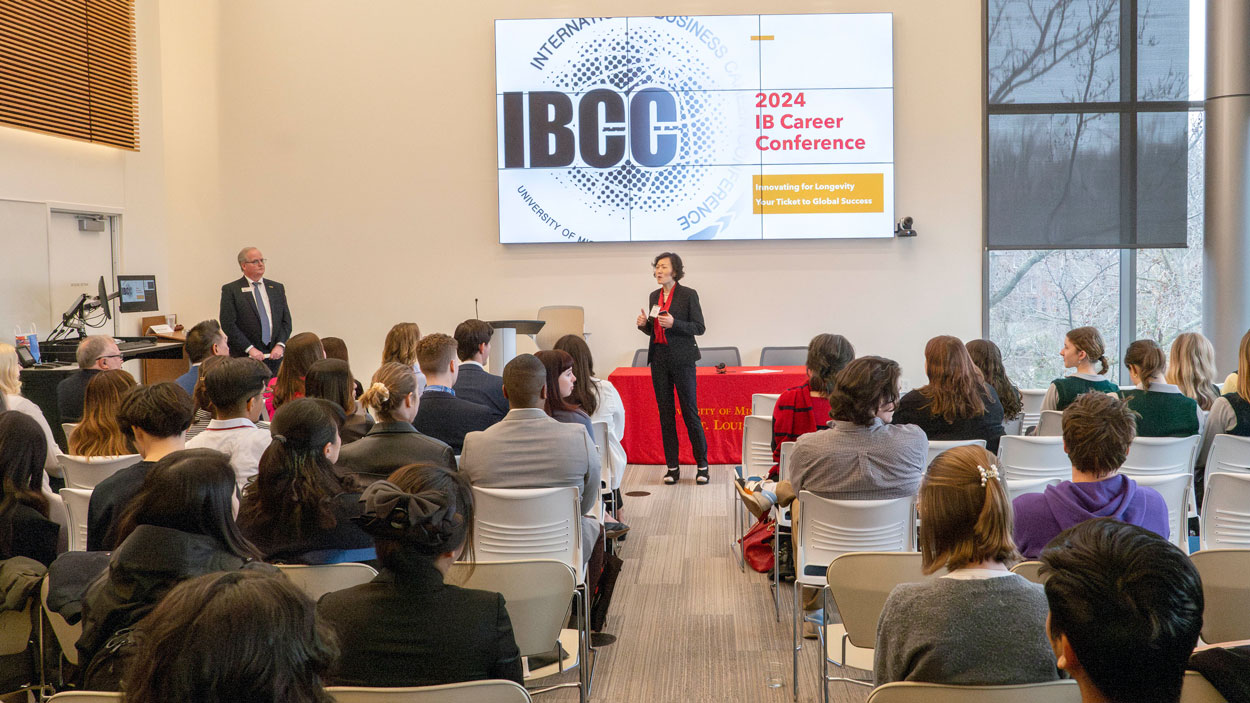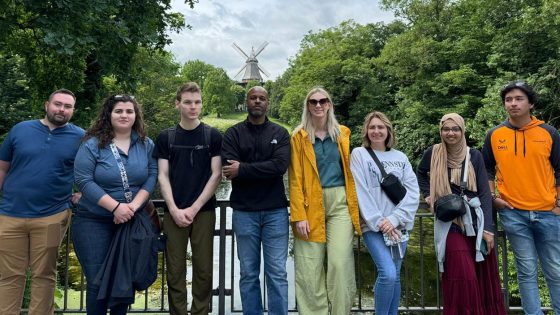Bussiness
UMSL’s International Business program continues to be recognized among nation’s best – UMSL Daily

UMSL’s International Business program continues to be recognized among nation’s best
College of Business Administration dean Shu Schiller talks with students at the International Business Career Conference this spring. (Photo by Derik Holtmann)
Joe Rottman, director of the International Business Institute at the University of Missouri–St. Louis, understands the value of expanding the world view of his students.
Rottman earned his bachelor’s and master’s degrees from UMSL, but he didn’t make his first journey outside the United States until he was a faculty member at his alma mater. That three-week trip to India in 2004, researching global sourcing of IT services, was transformative for Rottman, a first-generation college student from St. Louis.
“Prior to that trip, I had been on a plane just two or three times,” Rottman said, “to spend almost a month in India was an incredible experience which changed my life.”
It’s an experience he’s dedicated his career to sharing.
“We’re focused on showing how transformative international exposure can be for UMSL students,” Rottman said. “With a large percentage of transfer students, first-generation and Pell-eligible students, they often have kind of a narrow mindset of global business or global travel, so we’ve always focused on enhancing a global mindset of the students.”
That goal of enhancing the global outlook for UMSL students has helped UMSL’s International Business program remain one of the best in the country. For the 21st time in 22 years, UMSL’s undergraduate business program is ranked among the top 25 IB programs in the country by U.S. News and World Report, checking in at No. 20 for the 2025 rankings, up one spot from last year.
Rottman, who was first appointed director of the institute in 2010, takes pride in the honor, though he’s quick to praise others, including Program Manager Renita Miller. She’s been with the program 15 years. UMSL offers an International Business MBA, an MBA emphasis, a major and a minor for undergraduates and the International Business Honors program. And even students outside UMSL Business can still get a taste of international business.
“For classroom experiences for all of the students in the College of Business Administration, we’ve tried to imbue a broader perspective,” said Rottman, who is also a professor of information systems. “If you’re in a marketing class, what does international marketing look like? If you’re in a management class, what does global management look like? From the curricular perspective, the research of our faculty and then our extracurricular activities, like our career conference, the case competition and our study abroad programs, it’s all focused on increasing the global mindset.”
The value of a degree or emphasis in international business is increasing as the business world evolves. Part of the challenge for Rottman is making sure UMSL’s program is not only reacting to those changes but being proactive in anticipating what developments are on the horizon. Being on that cutting edge has kept UMSL in the U.S. News top 25 consistently.
“Very little of business now is not global,” Rottman said. “If you think of supply chains, every company is sourcing things globally. If you look at workforce development, that is also global and becoming increasingly so because many positions are remote. We are increasingly seeing what we call digital nomads. It doesn’t matter where in the world you are if you can produce the content and the quality that the employer is looking for.”
A big part of the UMSL’s equation is the study abroad program. Students who major in international business are required to have an international experience. In January, a study abroad trip will take students to Spain and Morocco. Next summer, there are separate study abroad programs in Germany, Finland and the United Kingdom.
“Enabling students to study abroad is the best part of my job,” Rottman said. “Being an administrator, there are some things that get you up in the morning and some things that keep you up at night. One of the things that gets me up in the morning is seeing what happens to a traditional UMSL student who spends a month in Germany or 10 days in London or Finland.”
UMSL doesn’t just offer these programs, but Rottman and others involved try to actively recruit and encourage students to go. They share stories and – probably most importantly – offering scholarships and financial aid to make it happen. Rottman is quick to credit the program’s advisory board, which includes leaders from top companies in St. Louis and across the country.
“We know that the biggest hurdle to study abroad for students is financial,” Rottman said. “Each student who went to Germany in June got a significant amount of help. We know those trips wouldn’t happen without scholarship support, and a lot of the scholarships come from our advisory board and other donors to the university.”
Rottman can’t help but think of UMSL’s mission statement: We Transform Lives.
“For our study abroad programs, it’s always normal to have many students on the trip who’ve never been abroad before, and it’s fairly typical to have one of our students getting on a plane for the first time,” Rottman said. “If you’re that student, you come back different. UMSL’s mission statement is ‘We Transform Lives,’ and that’s 100% evident in our international business program.”
Senior information systems and technology student Sean Davis was part of the group that spent a month in Bremen, Germany, this summer. While it wasn’t his first trip overseas – he was in the United States Army and traveled all over the world – he loved the experience so much that he’s planning to move to the Netherlands after he graduates from UMSL next spring.
A St. Louis native, Davis learned software development while he was in the Army – he served three tours in a combat zone in Iraq (2003-04, 2005-06 and again in 2010) and also spent most of 2007-08 serving in South Korea – and decided to use the GI Bill to get his degree from UMSL to add value to his thriving career as a software developer.
Davis had seen flyers for the Bremen trip, but as a nontraditional student, his inclination was to leave opportunities like that for more traditional students. Then one day this spring, Rottman made his study abroad pitch in one of Davis’ classes. Knowing Rottman also taught the capstone class for Davis’ degree, Davis sent an email and the two met soon after. It wasn’t long before Davis was heading to Germany for the first time as a civilian.
“Hindsight says it was a great marketing strategy because had I had only seen the flyer before,” Davis said with a laugh. “I wouldn’t have gone if he hadn’t talked to the class.”
Students on the Bremen trip have the option to take one or two classes at the University of Applied Sciences in Bremen, Germany, with the credits earned going toward their UMSL degree.
“I took a marketing class and a management class, and that factored into whether or not I was willing to go, as well,” Davis said. “They were classes that I already needed and had scheduled. Everything was falling into place. I couldn’t find reasons to not go, you know?”
One of the key components to each UMSL study abroad program is the opportunity for students to immerse themselves in the culture. With the Bremen program, students take classes from Monday through Thursday, but they have their nights and weekends free and are encouraged to participate in activities offered by the school or explore Europe on their own. On one of those long weekends, Davis flew his two sisters, Ashley and Aaliyah, to meet him in Amsterdam.

Students who went on the June 2024 study abroad trip to Bremen, Germany, had the opportunity to travel on weekends and explore Europe. (Photo courtesy of Sean Davis)
Rottman is committed to giving students on campus a full international business experience, too. UMSL has a mutually beneficial partnership with the University of Applied Sciences in Aschaffenburg, Germany and the University of Applied Sciences in Seinäjoki, Finland. Every year one of the schools hosts students and faculty from the other two.
“We’ve hosted five or six times over the 15 years of the program,” Rottman said. “This year, UMSL students that participate go over to Anheuser-Busch Hall the week of Thanksgiving, and the German and the Finnish students and faculty come here. That partnership is great because it allows us to give a robust international experience to students who stay in St Louis. We will host the program in November 2024 and then in May of 2025, our partner in Finland will host. Those partnerships are critical.”
Speaking of partnerships, 21 years ago UMSL was one of 10 founding members of the Consortium for Undergraduate International Business Education. Now, CUIBE has 31 full member universities and 17 associate member universities.
“The leaders of the IB programs in CUIBE live and breathe IB undergraduate education,” Rottman said. “Many of the schools in CUIBE are like us, a regional, commuter, first-gen Pell schools. And then we have larger members like Temple University and Northeastern University, as well as smaller, private schools that care about international business, like Bryant University in Rhode Island. All of us have helped each other more for than two decades to get better and make sure we have highly visible programs.”
Through a partial sponsorship by CUIBE, UMSL hosts an International Business Case Competition.
“We get 12 schools, including UMSL, that send teams of four undergraduate students that spend 2½ days on campus solving an international business case for a real company,” Rottman said. “On Thursday night, they get the case and work on it all day Friday. Then, Saturday morning, they present their solution to panels of executives. So that gets 11 other schools on campus to learn about our IB program.”
The annual International Business Career Conference, which is well into its second decade, is another event that draws students and faculty from around the country, and not just from CUIBE member universities. The goal of the conference, managed by Renita Miller, is to help students figure out what an international business career might look like, from those living the experience.
And the goal of the International Business program is to produce leaders in the industry.
“Companies that have to compete globally need to understand cultural dynamics,” Rottman said. “They need to understand international economics. They need to understand international monetary policy. They need to understand trade and supply chain agreements. Firms have to compete globally, so UMSL students need to have a global mindset. Our IB program helps instill that global perspective.”











